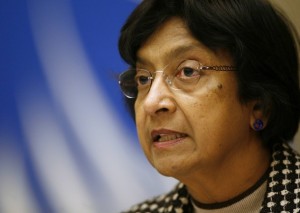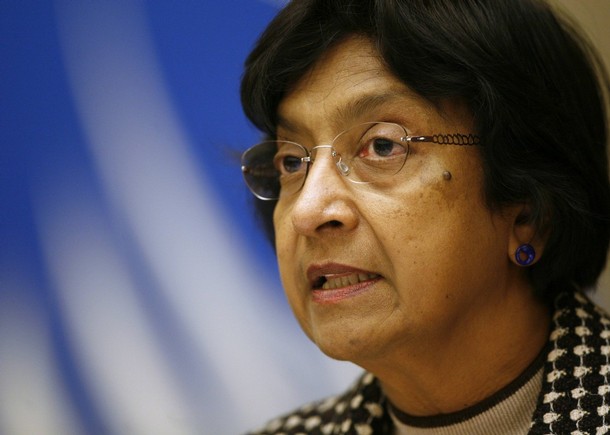
U.N. High Commissioner for Human Rights Pillay. REUTERS/Denis Balibouse
Today, 8 May 2013, the United Nations High Commissioner for Human Rights, Navi Pillay, issued a statement in which she expressed her deep concern regarding the critical state of human rights in Egypt. This comes in the wake of a joint appeal[1] sent by 22 Egyptian rights organizations to the High Commissioner for Human Rights on April 3 in which the organizations conveyed their concern over the rapid deterioration of the state of human rights in Egypt, warned that the bills to regulate NGOs currently being presented to the Shura Council would cripple the work of civil society, and condemned attacks on the independence of the judiciary and press freedoms. On 29 April, Pillay responded with a letter to CIHRS in which she thanked it for submitting this appeal.
The High Commissioner urged the Egyptian Government to take steps to ensure that the current version of a draft law on civil society organizations is laid open to careful examination by Egyptian and international human rights experts, and, based on their advice, is brought into line with international standards, before it is adopted by the Shura Council. She further noted that the new Constitution risks giving the Executive excessive power over the judiciary by providing for the direct appointment of judges to the Supreme Constitutional Court by the President, stating that “this concentration of power risks undermining the independence of the judiciary.”
On 4 May 2013, the Cairo Institute for Human Rights Studies (CIHRS) had submitted to the Egyptian presidency and to the Freedom and Justice Party (FJP) a legal commentary on the draft law on civic associations that was presented by the FJP to the Shura Council. The legal commentary pointed out the most significant problems with the draft law and found that the draft law does not meet international standards for freedom of association or comply with Egypt’s international commitments under international law. The CIHRS warned that the draft law, if passed, would meet intense criticism during Egypt’s upcoming Universal Periodic Review, scheduled to take place in October 2014. In addition, the CIHRS had held a closed round table discussion with a representative of the FJP, a representative of the United Nations Development Program, and representatives of international and Egyptian organizations to highlight the concerns referred to in the legal commentary on the draft law.
In her statement today, Pillay further stated, “If a law is passed that severely constrains the activities of civil society organizations, whose constructive contributions will be crucial to the country’s future direction as an inclusive democracy, it will mark a further blow to the hopes and aspirations that were raised during the 2011 ‘Egyptian Revolution.’ This is a critical moment, with mounting concerns about a range of issues. These include the new Constitution and the manner in which it was adopted, the apparent efforts to limit the authority of the judiciary, and this current draft law which risks placing civil society under the thumb of security ministries which have a history of abusing human rights and an interest in minimizing scrutiny.”
Two weeks ago, the CIHRS invited the UN Special Rapporteur on the promotion and protection of the right to freedom of opinion and expression to visit Egypt. During this time, meetings were held between the Special Rapporteur and Egyptian human rights organizations, and the Special Rapporteur also met with some of the members of the Shura Council’s Committee on Human Development and Local Administration. The CIHRS further attempted to secure a meeting for the Special Rapporteur with the presidency, yet these efforts were unsuccessful. It is important to note that the Egyptian Foreign Ministry rarely accepts requests by the UN Special Rapporteurs to conduct official country visits Egypt. The CIHRS expects to invite additional UN Special Rapporteurs to visit Egypt in order to contribute in the development of the draft law on associations in order to ensure that it complies with international standards.
In her statement of today, Pillay further criticized that “the latest draft [of the associations legislation], like previous ones, largely ignores inputs from local and international human rights organizations, and, if adopted, will impose a series of draconian restrictions on civil society organizations, especially those focused on human rights. It seems that there is a real risk that the current draft will not only make it difficult for civil society to operate freely and effectively, but may also conflict with Egypt’s obligations under international law to uphold the right to freedom of association.”
Finally, the High Commissioner warned that “governments that seek to constrain these types of activities, for example by controlling access to funds, giving sweeping oversight powers to security agencies, and placing undue constraints on international human rights organizations – all elements contained in the various drafts of this law – risk slipping quickly into authoritarianism, even if that is not their initial intention.”
Share this Post

